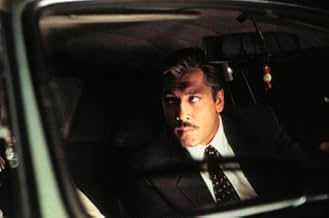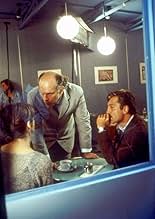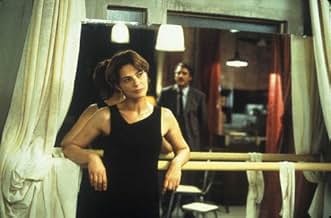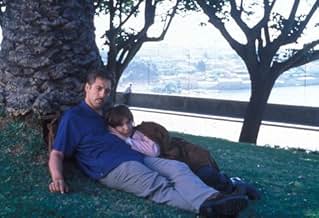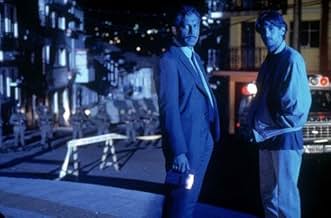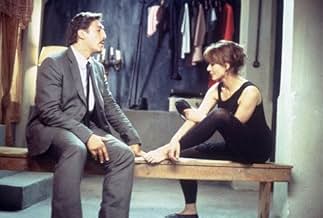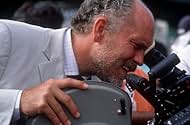CALIFICACIÓN DE IMDb
6.8/10
7.1 k
TU CALIFICACIÓN
Un detective de policía de un país sudamericano se dedica a dar caza a un líder guerrillero revolucionario.Un detective de policía de un país sudamericano se dedica a dar caza a un líder guerrillero revolucionario.Un detective de policía de un país sudamericano se dedica a dar caza a un líder guerrillero revolucionario.
- Premios
- 1 premio ganado y 3 nominaciones en total
Opiniones destacadas
Acclaimed actor John Malkovich has made his directorial debut with an assured political thriller that combines tension and intelligence to make for a gripping two and a quarter hours. The setting is a South American country which is unnamed, but the clear inspiration for the storyline is the early 1990s experience of Peru (which I have recently visited) when the bizarre Abimael Guzman led the murderous Shining Path movement, while the movie was shot in Spain, Portugal and Ecuador.
Javier Bardem plays Augustin Rejas, a former lawyer turned policeman who manages rare dignity and honesty as he battles with the interventions of a regime teetering on the edge of a military dictatorship and the pursuit of a fanatical revolutionary codenamed Ezekiel, while struggling with the varying emotions associated with a vapid wife, an adoring daughter, and his daughter's dance teacher, the eponymous and allurring woman upstairs (Laura Morante as Yolanda). Bardem - who reminds me of an early Raul Julia - gives a languid yet charismatic performance and hopefully we will see much more of this talented actor.
In some respects the work is reminiscent of Costa-Gavras's "State Of Siege", a clip of which is actually used here. However, the movie is based on a novel by the British writer Nicholas Shakespeare, who wrote the screenplay which features some conversation in Quechua (a native language of Peru and Bolivia), and this is a more personal examination of terrorism than the 1973 movie.
Javier Bardem plays Augustin Rejas, a former lawyer turned policeman who manages rare dignity and honesty as he battles with the interventions of a regime teetering on the edge of a military dictatorship and the pursuit of a fanatical revolutionary codenamed Ezekiel, while struggling with the varying emotions associated with a vapid wife, an adoring daughter, and his daughter's dance teacher, the eponymous and allurring woman upstairs (Laura Morante as Yolanda). Bardem - who reminds me of an early Raul Julia - gives a languid yet charismatic performance and hopefully we will see much more of this talented actor.
In some respects the work is reminiscent of Costa-Gavras's "State Of Siege", a clip of which is actually used here. However, the movie is based on a novel by the British writer Nicholas Shakespeare, who wrote the screenplay which features some conversation in Quechua (a native language of Peru and Bolivia), and this is a more personal examination of terrorism than the 1973 movie.
Having seen "Being John Malkovich" recently, I expected a lot from "The Dancer Upstairs" and I have to admit that I really was enchanted by it. Even though it never says which country in South America this story is based on, it's clear that it must be Peru. There just are too many references to the rebel movement The Shining Path, president Fujimori... But it's good that it never says that it is actually Peru. There are more South American dictatorships, more rebel movements...
It tells the story of an ex-lawyer who has become police officer, because he wanted justice to be done in the right way. He has to hunt down and arrest a revolutionary guerilla leader, but as he digs deeper, he'll find out that more people are actually supporting the rebels than he thought, even the people that he never suspected...
What I liked so much about the movie is the way it portrays everything. It doesn't fear to show the violence committed by both sides, but also shows the beautiful side of the country (its landscapes, its culture,...). Some say this is clearly a right-wing movie and that Malkovich is right wing as well. What has the political preference of the director to do with it? This movie isn't right-wing, nor is it left-wing. It clearly shows both sides, giving you the police detective who works for the right-wing government, who falls in love with the left-wing activist.
If there is one remark that I have to make, than it must be the fact that the actors didn't speak in Spanish. Now they had some weird Spanish-English accent. But all the rest was really very good. I give it an 8.5/10.
It tells the story of an ex-lawyer who has become police officer, because he wanted justice to be done in the right way. He has to hunt down and arrest a revolutionary guerilla leader, but as he digs deeper, he'll find out that more people are actually supporting the rebels than he thought, even the people that he never suspected...
What I liked so much about the movie is the way it portrays everything. It doesn't fear to show the violence committed by both sides, but also shows the beautiful side of the country (its landscapes, its culture,...). Some say this is clearly a right-wing movie and that Malkovich is right wing as well. What has the political preference of the director to do with it? This movie isn't right-wing, nor is it left-wing. It clearly shows both sides, giving you the police detective who works for the right-wing government, who falls in love with the left-wing activist.
If there is one remark that I have to make, than it must be the fact that the actors didn't speak in Spanish. Now they had some weird Spanish-English accent. But all the rest was really very good. I give it an 8.5/10.
It's Latin America in the Recent Past. Agustín Rejas (Javier Bardem) is a Sergeant manning a road check. The country is corrupt with a militaristic Presidency. Rejas is a former lawyer ready for a promotion in the capital. A mysterious man with others and a dead dog in a truck escape the checkpoint. Then it's five years later. He's a police Lieutenant. With his young partner Sucre (Juan Diego Botto), he's investigating a mysterious revolutionary group led by Ezequiel. They hang dogs from the lamp posts. The violence escalates as leaders get assassinated. Yolanda (Laura Morante) is Rejas' daughter Laura's dance teacher. He begins an affair with her as he suspects her connection to Ezequiel.
The non-specificity of the time and place could have been improved by weaving the real story into this movie. It doesn't have to be perfect and most movies aren't real biographies anyways. The great aspect of this is Bardem and the sense of Latin America that this projects. John Malkovich is directing for the first time and he shows some competency. It is well-made and most importantly, he focuses on Bardem. The story does leave some questions. The ballet teacher's connections to everyone is very convenient. The investigation is not that clear. I don't know how nebulous the book is but adapting may have left something out of the movie. It would help to have great clarity, and better intensity.
The non-specificity of the time and place could have been improved by weaving the real story into this movie. It doesn't have to be perfect and most movies aren't real biographies anyways. The great aspect of this is Bardem and the sense of Latin America that this projects. John Malkovich is directing for the first time and he shows some competency. It is well-made and most importantly, he focuses on Bardem. The story does leave some questions. The ballet teacher's connections to everyone is very convenient. The investigation is not that clear. I don't know how nebulous the book is but adapting may have left something out of the movie. It would help to have great clarity, and better intensity.
A curious but not entirely unexpected idiossyncratic choice from John Malkovich for his directing debut, this adaptation of Nicholas Shakespeare's novel fictionalising the capture of the leader of the Peruvian Shining Path revolutionary movement is a more pensive, less political throwback to the European "political thrillers" of the 1970s made popular by directors such as Costa-Gavras. Malkovich, however, dislocates the film's centre from politics into personal mores, following the story of Javier Bardem, as the police detective assigned to discover the whereabouts of the mysterious terrorist leader "Ezequiel". In a superbly controlled performance, Bardem emphasizes the vulnerability of this disenchanted, seen-it-all cop thrown against his will into the frying-pan and the way he attempts to maintain his dignity and uphold the law he no longer believes in. Malkovich proves an engaging director - despite its lengthy running time (and although it could use a slight trim), the film is neither predictable nor overstays its welcome, and the actors deliver consistently good performances. One wishes Malkovich had looked for a better story to tell, but as debuts go this is a promising one.
I suppose this could be described as an off-Hollywood detective story with political overtones. It is based on a book by Nicholas Shakespeare (a part-time Australian) who has in turn loosely based his story on the rise and fall of the `Shining Path' or Sendero Luminoso insurgency in Peru (1980-1995). As rendered on film (Shakespeare also wrote the screenplay), we have an immensely likable policemen, Rejas, played to perfection by Javier Bardem, literally searching through the rubbish to find the shadowy Ezequiel, leader of a movement with a fine record of atrocities, but no program or real philosophy.
Nicholas, alas, is no Shakespeare, and the film becomes very slow in parts, though there are plenty of dramatic moments and some crisp editing. Bardem gets good support from some of the other actors such as Juan Diego Botto who plays his sidekick Sucre and Laura Morante as Yolanda the enigmatic ballet teacher he becomes involved with. Most of the cast are Spanish but the prodution was filmed in English, which has created an intermittent audibility problem. The film is also beautifully shot, the locations in Ecuador and Oporto, Portugal, being used to great advantage.
While the film succeeds quite well as a detective story it telegraphs too many punches to work as a thriller. However it's the politics that really let it down. Clearly, we have a not very nice, if elected, government under attack, and it's almost inevitable that the even more not very nice Army is going to step in. Against who? People who load up dogs with dynamite and send them in to crowded marketplaces. People who send in 10 year olds into village cafes to blow up themselves along with some local notables. The explanation for this comes only in one-liners such as `I am already dead, I live only for the revolution.' When Ezequiel, the former philosophy lecturer is finally captured, all he can say is `You cannot capture this ` (tapping his forehead). `We are already part of history.' Surely there is a better explanation for `Shining Path' than this. My own theory is that it is a rather nasty combination of French post-modern philosophy (Derrida, Foucault etc) mixed up with Marxism and Maoism and served up to people with not much to lose. If you are already dead you might as well die for the revolution. It's either that or slave for the whites.
Actually, `Shining Path' had some competition in the shape of Tupac Amaru, who captured the Japanese Embassy in Lima and held 70 or so people hostage for over 4 months in 1996-97, until being overwhelmed by Peruvian commandos who tunnelled in beneath them. None of the guerrillas survived. By the time I visited Lima and the Cuzco area in late 2000 all was quiet on the revolutionary front, though President Fujimori, hero of the embassy siege, despite having won a recent election was on his way out. I haven't read it yet, but I'm told Gustavo Gorriti's `The Shining Path: A History of the Millenarian War in Peru' is a good history of the era.
Maybe it's asking too much for political explanations, though the director clearly wants the film to be compared with Costa-Gravas' excellent `State of Siege' (which is shown briefly at one point and provides a vital clue as to Ezequiel's location). As to the direction, Malkovich seems a little uncertain whether he is making a thriller or something more reflective but he has a good sense of dramatic timing and a good visual sense. Perhaps more attention to the editing would have sharpened up the mood.
Nicholas, alas, is no Shakespeare, and the film becomes very slow in parts, though there are plenty of dramatic moments and some crisp editing. Bardem gets good support from some of the other actors such as Juan Diego Botto who plays his sidekick Sucre and Laura Morante as Yolanda the enigmatic ballet teacher he becomes involved with. Most of the cast are Spanish but the prodution was filmed in English, which has created an intermittent audibility problem. The film is also beautifully shot, the locations in Ecuador and Oporto, Portugal, being used to great advantage.
While the film succeeds quite well as a detective story it telegraphs too many punches to work as a thriller. However it's the politics that really let it down. Clearly, we have a not very nice, if elected, government under attack, and it's almost inevitable that the even more not very nice Army is going to step in. Against who? People who load up dogs with dynamite and send them in to crowded marketplaces. People who send in 10 year olds into village cafes to blow up themselves along with some local notables. The explanation for this comes only in one-liners such as `I am already dead, I live only for the revolution.' When Ezequiel, the former philosophy lecturer is finally captured, all he can say is `You cannot capture this ` (tapping his forehead). `We are already part of history.' Surely there is a better explanation for `Shining Path' than this. My own theory is that it is a rather nasty combination of French post-modern philosophy (Derrida, Foucault etc) mixed up with Marxism and Maoism and served up to people with not much to lose. If you are already dead you might as well die for the revolution. It's either that or slave for the whites.
Actually, `Shining Path' had some competition in the shape of Tupac Amaru, who captured the Japanese Embassy in Lima and held 70 or so people hostage for over 4 months in 1996-97, until being overwhelmed by Peruvian commandos who tunnelled in beneath them. None of the guerrillas survived. By the time I visited Lima and the Cuzco area in late 2000 all was quiet on the revolutionary front, though President Fujimori, hero of the embassy siege, despite having won a recent election was on his way out. I haven't read it yet, but I'm told Gustavo Gorriti's `The Shining Path: A History of the Millenarian War in Peru' is a good history of the era.
Maybe it's asking too much for political explanations, though the director clearly wants the film to be compared with Costa-Gravas' excellent `State of Siege' (which is shown briefly at one point and provides a vital clue as to Ezequiel's location). As to the direction, Malkovich seems a little uncertain whether he is making a thriller or something more reflective but he has a good sense of dramatic timing and a good visual sense. Perhaps more attention to the editing would have sharpened up the mood.
¿Sabías que…?
- TriviaThe story is inspired by the Maoist insurgency in Peru known as the Shining Path. Its leader Abimael Guzmán, who was known by the nom de guerre President Gonzalo, was captured in an apartment above a ballet studio in the capital city of Lima in 1992. The ballet teacher Yolanda was based on Maritza Garrido Lecca, the woman in whose apartment Guzmán was found. Bardem's character was inspired by Benedicto Jimenez and Gen. Antonio Ketin Vidal, the leading figures responsible for Guzmán's capture.
- ErroresWhen Sucre & Llosa arrest the young woman in orange, she has been handcuffed to the ceiling of the car. But then en route, soldiers simply drag her out of the backseat. No handcuff keys. No bolt cutters.
- Citas
Agustín Rejas: I'd like to have a list of staff with access to the President's chambers.
Calderón: Luckily there are only two of them. The first is named 'Fuck', the second is named 'Off'.
- Créditos curiososThe producers would like to thank ... the residents of Narcisos Street ...
- ConexionesFeatured in Revealing 'The Dancer Upstairs' (2003)
- Bandas sonorasViagens Interditas
(1995)
Written by Pedro Malgheas (as Pedro Ayres) and Rodrigo Leão
Performed by Madredeus
Licensed by Dpte. de Productos Especiales de
(p) EMI Odean, S.A., Madrid, Spain, 2001 exclusive rights holder
Selecciones populares
Inicia sesión para calificar y agrega a la lista de videos para obtener recomendaciones personalizadas
- How long is The Dancer Upstairs?Con tecnología de Alexa
Detalles
Taquilla
- Total en EE. UU. y Canadá
- USD 2,377,348
- Fin de semana de estreno en EE. UU. y Canadá
- USD 106,142
- 4 may 2003
- Total a nivel mundial
- USD 5,227,348
- Tiempo de ejecución2 horas 12 minutos
- Color
- Mezcla de sonido
- Relación de aspecto
- 1.85 : 1
Contribuir a esta página
Sugiere una edición o agrega el contenido que falta

Principales brechas de datos
By what name was Sendero de sangre (2002) officially released in Canada in English?
Responda


